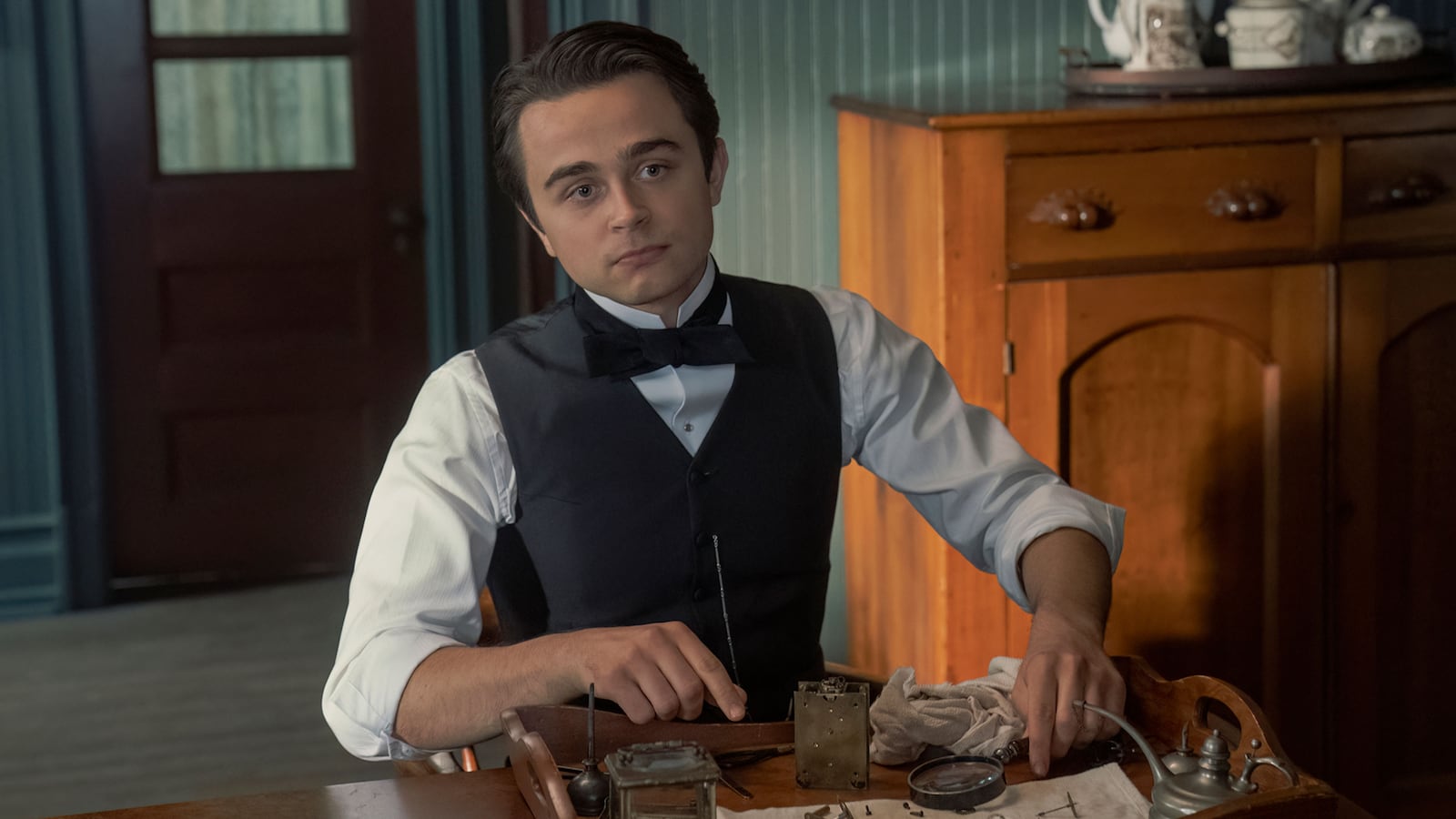From petty quarrels to micromanaging who her adult children date, Bertha Russell’s (Carrie Coon) desire to rule the New York high society playground is at the heart of HBO’s The Gilded Age. However, Bertha is far from the only character striving for something better in a country guarded by old money gatekeepers. Another plot ticking along in the background of Season 2 has me equally rapt. Somehow, I am now as invested in the van Rhijn footman Jack Treacher’s (Ben Ahlers) alarm clock-making fate as I am in Bertha’s quest for dominance.
It turns out I am not alone.
What seemed like little more than a comedic “Oops, I slept in” storyline in the second episode has developed into a season-long arc, which is getting more screen time than Jack’s ongoing flirtation with the Russell lady’s maid, Adelheid (Erin Wilhelmi). It would have been easy for the series to do the whole “star-crossed lovers from rival 61st Street households” thing, particularly as floppy-haired Ahlers has a strong touch of Timothée Chalamet about his wide eyes and slender frame. Instead of delivering a speech worthy of Laurie from Little Women, Jack’s free time is consumed by the mechanisms in a standard 19th-century alarm clock.
Turning down a romantic subplot is not my style, and The Gilded Age could do with more hot and heavy pairings like Larry’s (Harry Richardson) short-lived affair with Mrs. Blane (Laura Benanti) or Bertha and George Russell (Morgan Spector), who eye-bang like the best of them. However, I have to applaud this series for its mix of low-stakes storylines and hidden history threads that have me searching online for more information on everything from the Brooklyn Bridge engineers to Booker T. Washington’s work at the Tuskegee Normal and Industrial Institute. In the case of Jack, low-stakes and Googling alarm clock inventions go hand-in-hand.
In the van Rhijn kitchen, the staff have spent the last few weeks spouting dialogue that has saved me from picking up my phone mid-episode. Sure, Bannister (Simon Jones) transforms into Captain Exposition whenever the audience needs an information dump, but who am I to say he doesn’t have friends with patents and even clock-making experience? Here, he tag-teams with Peggy (Denée Benton) to explain the whole shebang. It helps that Jones and Benton—like the majority of this cast—effortlessly deliver chunks of facts, and I end up believing Bannister has all these convenient connections. At the very least, the van Rhijn butler would be an ideal trivia night teammate, because this man knows everything.
The downstairs on either side of the affluent street is a hive of activity and gossip, but the van Rhijn servants typically have fewer social visits to deal with. It doesn’t mean less work, as Jack—or John as Bannister and the upstairs residents call him—and other staff members have more than one role. He is the footman and the hall boy, a jack of all trades if we’re going to get cute with his name.
Ticking time bomb
So far, Jack’s greatest misdemeanor has been sleeping in, and the flustered panic when he enters the kitchen is a familiar and awful sensation recognizable to anyone who has had an alarm failure. Even now, the loudest of smartphone sirens can be snoozed or forgotten to set (been there recently!), and whether it is a user or device error, the jolt running through your body when you wake up late is unforgettable. Ahlers nails the panicked man with floppy bedhead who is hastily getting dressed and sincerely apologizing to all your co-workers. “I wonder why they don’t work?” is an offhand question from Jack that will soon consume his waking hours.
Despite this frantic start to the day, Jack is a reliable worker in the van Rhijn household, though his project to figure out why his clock failed to sound does cause minor havoc during one already farcical dinner service. Agnes van Rhijn’s (Christine Baranski) mood is permanently perturbed, so when Jack’s alarm punctuates the already fraught conversation, it is dream comedic timing. “H-what on earth is that noise?!” she exclaims. Ahlers’ Disney prince face is a mix of terror and dopey awkwardness, his eyebrows giving Colin Farrell a run for their money. The Gilded Age now has an awareness it lacked in its first season, and the sheer absurdity of this sequence (including a bee) encapsulates the silly delight of low-stakes plotting.
Baranski pronouncing “what” with an “H” at the start will never not entertain me, and each eye roll and exasperated sigh is strangely soothing. However, it would be a waste if this were all she did, and in the recent episode, “Warning Shots,” Agnes shows her softer side when the topic of patent fees arises. OK, this is in the same episode where she suggests that even Jesus would understand why Marian (Louisa Jacobson) would skip her commitment to teach an impoverished class commitment for a potential suitor. But even the most tone-deaf characters in this series contain multitudes, and Agnes views her staff as part of the family.
It doesn’t get into Shark Tank pitching territory because Jack tries to refuse financial support, partly out of politeness and fear, as he doesn’t think he can repay anyone if his patent application is rejected. Earlier in Bannister’s Patent 101 explainer, the butler says it costs $15 to apply for a patent and a further $20 if granted. When Agnes gives him a comically large $5 bill, he tries to tell her he already has enough, which she quips. “No one has enough money.”
Concern about being in debt stems from the chief asshole on the van Rhijn staff, aka Agnes’ maid Armstrong (Debra Monk), who has spent every opportunity shitting on Jack’s dream. The embittered woman flexes about not needing an alarm clock to wake up and is always on hand to offer zero encouragement. “Good luck with that, I don’t think,” she tells him at one point. Armstrong’s sourness is over-the-top villainy, but it would be far too saccharine if Jack were surrounded by nothing but cheerleaders.
Patent problems
The Gilded Age swings wildly between social issues relevant to the 21st century—like systemic racism and labor strikes—and petty feuds. The latter also occupies space in today’s climate, which is why those social climber stories are so appealing, but it also means that watching Julian Fellowes’ series can induce whiplash. Jack’s clock plot sits in the pendulum’s path, going from gloriously silly to reflecting a more significant issue at play.
This week’s jam-packed episode, “Warning Shots,” exemplifies this array of storylines, featuring a strike seconds away from bloody violence, racism at the heart of the New York education board, a cancer diagnosis, and an extremely awkward public proposal. After weeks of not knowing where Jack’s clock tinkering is heading, the broader picture shifts into focus, moving from the kitchen table to the patent office. Until now, it is a flirtation with clockmaking out of curiosity about how this relatively recent ubiquitous item is famously flawed—almost everyone mentions the inconsistency of the alarm going off.
The first adjustable mechanical alarm clock was patented by French inventor Antoine Redier in 1847. In taking apart the clock, Jack has zeroed in on the escapement as the issue, which stopped working thanks to oil build-up. He has designed a new mechanism to avoid this flaw, and the dialogue explicitly describes this in layman's terms for both his co-workers and the audience. Jack turned his sleeping-in shame into ingenuity, and taking apart the faulty product taps into the innovation of this period. You can work your way up from the kitchen to the top of the rung.
Unfortunately, not everyone gets to become a George Russell, as Jack immediately finds opposition to his application that has nothing to do with his skills.
The patent process sounds familiar to anyone who has been to a government-run office in 1883 or 2023. Jack took time off work, stood in line, filled out forms, and paid the fee. He also has to wait for a letter to discover his fate, and Ahlers captures the gut-wrenching feeling of nervous anticipation before knowing the contents of the envelope.
Hope doesn’t last long, and it is a kick in the gut when a glassy-eyed Jack explains his work can’t be considered as he doesn’t belong to a “horological institute or society.” Like cook Mrs. Bauer (Kristine Nielsen), I wasn’t entirely sure what this word meant initially; thankfully, Bannister is on hand to explain it is an umbrella term for “clockmaker.” The all-knowing butler also looks like a man with a plan up his sleeve.
While Jack seems resolved to give up and move on (“Sanity returns to 61st Street,” Armstrong rejoices, true to form), this storyline feels far from over, and I am not ready for this footman to throw in the towel. He might lack official qualifications and doesn’t belong to a clock club, but this season of The Gilded Age applies the Bertha Russell determination diet to all. Bertha wasn’t allowed a box at the elite Academy, so she found an alternative venue, and her climb to the top is ongoing.
It is a bumpy ride for anyone stepping outside their circle of existence, and Jack’s alarm clock ambition is a small cog in the American Dream machine with plenty of parts to block your progress. Will Jack find success? Only time will tell.






